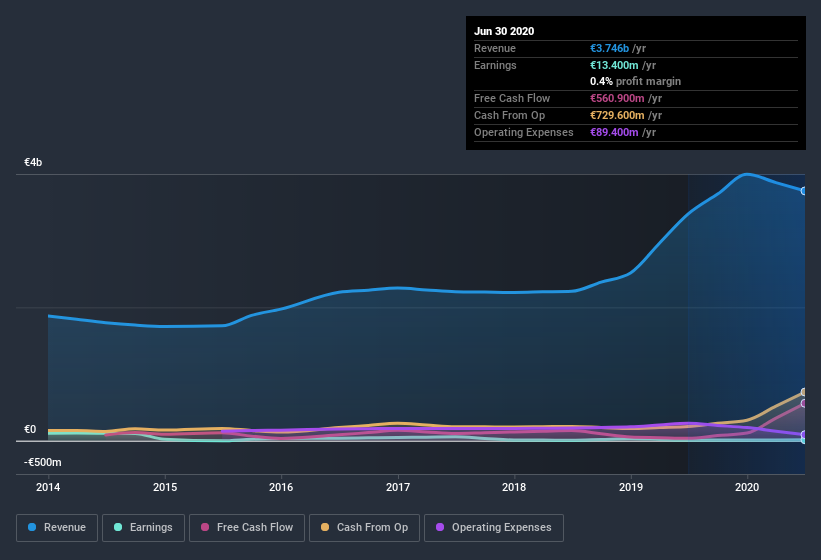- France
- /
- Healthcare Services
- /
- ENXTPA:GDS
Here's Why Ramsay Générale de Santé's (EPA:GDS) Statutory Earnings Are Arguably Too Conservative

As a general rule, we think profitable companies are less risky than companies that lose money. Having said that, sometimes statutory profit levels are not a good guide to ongoing profitability, because some short term one-off factor has impacted profit levels. In this article, we'll look at how useful this year's statutory profit is, when analysing Ramsay Générale de Santé (EPA:GDS).
While Ramsay Générale de Santé was able to generate revenue of €3.75b in the last twelve months, we think its profit result of €13.4m was more important. While it managed to grow its revenue over the last three years, its profit has moved in the other direction, as you can see in the chart below.
View our latest analysis for Ramsay Générale de Santé

Not all profits are equal, and we can learn more about the nature of a company's past profitability by diving deeper into the financial statements. As a result, we think it's well worth considering what Ramsay Générale de Santé's cashflow (when compared to its earnings) can tell us about the nature of its statutory profit. Note: we always recommend investors check balance sheet strength. Click here to be taken to our balance sheet analysis of Ramsay Générale de Santé.
A Closer Look At Ramsay Générale de Santé's Earnings
One key financial ratio used to measure how well a company converts its profit to free cash flow (FCF) is the accrual ratio. In plain english, this ratio subtracts FCF from net profit, and divides that number by the company's average operating assets over that period. This ratio tells us how much of a company's profit is not backed by free cashflow.
That means a negative accrual ratio is a good thing, because it shows that the company is bringing in more free cash flow than its profit would suggest. That is not intended to imply we should worry about a positive accrual ratio, but it's worth noting where the accrual ratio is rather high. That's because some academic studies have suggested that high accruals ratios tend to lead to lower profit or less profit growth.
Ramsay Générale de Santé has an accrual ratio of -0.23 for the year to June 2020. That indicates that its free cash flow quite significantly exceeded its statutory profit. In fact, it had free cash flow of €561m in the last year, which was a lot more than its statutory profit of €13.4m. Ramsay Générale de Santé's free cash flow improved over the last year, which is generally good to see.
Our Take On Ramsay Générale de Santé's Profit Performance
As we discussed above, Ramsay Générale de Santé's accrual ratio indicates strong conversion of profit to free cash flow, which is a positive for the company. Based on this observation, we consider it possible that Ramsay Générale de Santé's statutory profit actually understates its earnings potential! And the EPS is up 25% over the last twelve months. Of course, we've only just scratched the surface when it comes to analysing its earnings; one could also consider margins, forecast growth, and return on investment, among other factors. Keep in mind, when it comes to analysing a stock it's worth noting the risks involved. At Simply Wall St, we found 1 warning sign for Ramsay Générale de Santé and we think they deserve your attention.
This note has only looked at a single factor that sheds light on the nature of Ramsay Générale de Santé's profit. But there are plenty of other ways to inform your opinion of a company. Some people consider a high return on equity to be a good sign of a quality business. While it might take a little research on your behalf, you may find this free collection of companies boasting high return on equity, or this list of stocks that insiders are buying to be useful.
When trading Ramsay Générale de Santé or any other investment, use the platform considered by many to be the Professional's Gateway to the Worlds Market, Interactive Brokers. You get the lowest-cost* trading on stocks, options, futures, forex, bonds and funds worldwide from a single integrated account. Promoted
New: AI Stock Screener & Alerts
Our new AI Stock Screener scans the market every day to uncover opportunities.
• Dividend Powerhouses (3%+ Yield)
• Undervalued Small Caps with Insider Buying
• High growth Tech and AI Companies
Or build your own from over 50 metrics.
This article by Simply Wall St is general in nature. It does not constitute a recommendation to buy or sell any stock, and does not take account of your objectives, or your financial situation. We aim to bring you long-term focused analysis driven by fundamental data. Note that our analysis may not factor in the latest price-sensitive company announcements or qualitative material. Simply Wall St has no position in any stocks mentioned.
*Interactive Brokers Rated Lowest Cost Broker by StockBrokers.com Annual Online Review 2020
Have feedback on this article? Concerned about the content? Get in touch with us directly. Alternatively, email editorial-team@simplywallst.com.
About ENXTPA:GDS
Ramsay Générale de Santé
Operates healthcare facilities in France, Sweden, Norway, Denmark, and Italy.
Good value with imperfect balance sheet.


